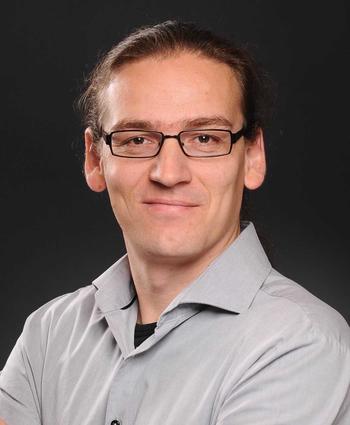Dr. Michael Kleineberg
Open Access and academic publishing

Research and Publication Services - Academic Publishing/Open Access
14195 Berlin
Dr. Michael Kleineberg is a staff member at the Open Access publishing house Berlin Universities Publishing and your contact for advice on the following topics:
- Open Access publishers and journals
- Advice on founding and transforming journals
- Services for academic publishing
- Hosting services for Open Journal Systems (OJS) and Open Monograph Press (OMP)
If you have general questions on the subject of Open Access, you can also obtain information from our central website.
ORCID iD: 0000-0002-6313-6795
Academic and professional career
|
04/2023 - today |
Staff member in Open Access publishing house Berlin Universities Publishing in sections BerlinUP Journals and BerlinUP Beratung (BerlinUP) |
|
02/2021 - 03/2023 |
Project member in BUA project „Distributed Network for Publishing Services” at university library of Freie Universität Berlin (DNPS) |
|
08/2013 – 01/2022 |
Lecturer for „Grundlagen Metadaten und Erschließung“ in library science at Applied University Potsdam |
|
11/2019 – 09/2021 |
Project member in Mellon project „Shaping the iSchools' Identity and Interaction in a Globalized World“ (i4G) at Berlin School of Library and Information Science, Humboldt-Universität zu Berlin |
|
05/2018 – 11/2019 |
Project member in DFG project „Future e-Research Support in the Humanities“ (FuReSH) at university library of Humboldt-Universität zu Berlin |
|
05/2016 – 06/2018 |
Project member in DFG project „Elektronische Dissertationen Plus“ (eDissPlus) at university library of Humboldt-Universität zu Berlin |
|
05/2014 – 04/2016 |
Project member in DFG project „Future Publications in den Humanities“ (Fu-PusH) at university library of Humboldt-Universität zu Berlin |
|
11/2011 – 04/2014 |
Project member in EU project „Participative Research labOratory for Multimedia and Multilingual Information Systems Evaluation“ (PROMISE) at Berlin School of Library and Information Science, Humboldt-Universität zu Berlin |
|
10/2006 – 11/2011 |
Study of library and information science and German literature at Berlin School of Library and Information Science, Humboldt-Universität zu Berlin |
|
10/2000 – 01/2003 |
Vocational training as bookseller at Thalia Universitätsbuchhandlung Eiche and Gutenbergschule Leipzig |
ORCID iD: 0000-0002-6313-6795
On academic publishing
2018 (with Ben Kaden). Zur Veröffentlichung dissertationsbezogener Forschungsdaten – Perspektiven und Kompetenzen von Promovierenden an Berliner Universitäten. Bausteine Forschungsdatenmanagement 1, 64-69. DOI: 10.17192/bfdm.2018.1.7938
2018 (with Ben Kaden). Guidelines zur Veröffentlichung dissertationsbezogener Forschungsdaten. edoc-Server der Humboldt-Universität zu Berlin. DOI: 10.18452/18811
2017 (with Ben Kaden). Open Humanities? ExpertInnenmeinungen über Open Access in den Geisteswissenschaften. LIBREAS. Library Ideas 32. DOI: 10.18452/19096
2017 (with Ben Kaden). Zur Situation des digitalen geisteswissenschaftlichen Publizierens. Erfahrungen aus dem DFG-Projekt „Future Publications in den Humanities“. BIBLIOTHEK – Forschung und Praxis 41 (1), 7-14. DOI: 10.1515/bfp-2017-0009
2017 (with Dirk Weisbrod and Ben Kaden). eDissPlus – Optionen für die Langzeitarchivierung dissertationsbezogener Forschungsdaten aus Sicht von Bibliotheken und Forschenden. In: Jonas Kratzke and Vicent Heuveline (eds.): E-Science-Tage 2017. Forschungsdaten managen, 189-198. DOI: 10.11588/heibooks.285.377
2016 (with Ben Kaden and Martin Walk). Fu-PusH Dossiers. Auswertung von Experteninterviews im Rahmen des DFG „Future Publications in den Humenities“. DOI: 10.5281/zenodo.51174
2015 (with Ben Kaden and Martin Walk). Fu-PusH Statement Finder 1.0. Software. DOI: 10.5281/zenodo.35233
2015 (with Ben Kaden and Martin Walk). Forschungsdatensatz des Fu-PusH Statement Finders: Einzelaussagen aus Experteninterviews zum digitalen Publizieren in den Geisteswissenschaften. Forschungsdaten. DOI: 10.5281/zenodo.35217
On knowledge organization
2022. "Klassifikation" In Rainer Kuhlen, Dirk Lewandowski, Wolfgang Semar and Christa Womser-Hacker (eds.) Grundlagen der Informationswissenschaft, 195-205. De Gruyter Saur: Berlin, Boston. DOI: 10.1515/9783110769043-017
2022. "Monothetic Classification and Polythetic Classification: A Cognitive-Developmental Perspective" In Marianne Lykke et a.. (eds.): Knowledge Organization across Disciplines, Domains, Services and Technologies, 159-171. Ergon: Baden-Baden. DOI: 10.5771/9783956509568-159
2021. Integrative Levels of Knowing. A Cognitive-Developmental Approach to Knowledge Organization. Doctoral thesis. Humboldt-Universität zu Berlin. DOI: 10.18452/23212
2020. “Classifying Perspectives: Expressing Levels of Knowing in the Integrative Levels Classification.” In Marianne Lykke et al. (eds.): Knowledge Organization at the Interface, 489-493. Ergon: Baden-Baden. DOI: 10.5771/9783956507762-489
2018. “Reconstructionism: A Comparative Method for Viewpoint Analysis and Indexing Using the Example of Kohlberg’s Moral Stages.” In Fernanda Riberio and Maria E. Cerveira (eds.): Challenges and Opportunities for Knowledge Organization in the Digital Age, 400–408. Ergon: Baden-Baden. DOI: 10.5771/9783956504211-400
2017. “Integrative Levels.” Knowledge Organization 44 (5), 349–79. DOI: 10.5771/0943-7444-2017-5-349. Online version with extended appendix in Birger Hjørland and Claudio Gnoli (eds.): ISKO Encyclopedia of Knowledge Organization. https://www.isko.org/cyclo/integrative_levels
2016. “Integral Methodological Pluralism: An Organizing Principle for Method Classification.” In José Augusto Guimaraes, Suellen Oliveira Milani, and Vera Dodebei (eds.): Knowledge Organization for a Sustainable World. Challenges and Perspectives for Cultural, Scientific, and Technological Sharing in a Connected Society, 133–41. Würzburg: Ergon. DOI: 10.5771/9783956504389-133
2016. “From Linearity to Co-Evolution: On the Architecture of Nicolai Hartmann’s Levels of Reality.” In Keith Peterson and Roberto Poli (eds.): New Research on the Philosophy of Nicolai Hartmann, 81–108. Berlin, Boston: De Gruyter. DOI: 10.1515/9783110434378-006
2016. Book review: “‘Interdisciplinary Knowledge Organization’ by Rick Szostak, Claudio Gnoli, and María López-Huertas.” Knowledge Organization 43 (8), 663–67. DOI: 10.5771/0943-7444-2016-8-663
2015. Book review: “Dahlberg’s ‘Wissensorganisation’ and Smiraglia’s ‘Elements of Knowledge Organization.’” Knowledge Organization 42 (3), 190–95. DOI: 10.5771/0943-7444-2015-3-190
2014. “Integrative Levels of Knowing: An Organizing Principle for the Epistemological Dimension.” In Wiesław Babik (ed.): Knowledge Organization in the 21st Century. Between Historical Patterns and Future Prospects. Proceedings of the 13th International ISKO Conference, 80–87. Würzburg: Ergon.
2013. Book review: “Eine neue Archäologie des Wissens. Arno Bammé‘s ‘Homo occidentalis: Von der Anschauung zur Bemächtigung der Welt. Zäsuren abendländischer Epistemologie’.” LIBREAS. Library Ideas 22, 61–66. DOI: 10.18452/9032
2013. “The Blind Men and the Elephant: Towards an Organization of Epistemic Contexts.” Knowledge Organization 40 (5), 340–62. DOI: 10.5771/0943-7444-2013-5-340
2012. “Die elementaren Formen der Klassifikation: Ein strukturgenetischer Beitrag zur Informationsgeschichte.” Berliner Handreichungen zur Bibliotheks- und Informationswissenschaft. 325, 1–145. Master thesis. Humboldt-Universität zu Berlin. DOI: 10.18452/2068
